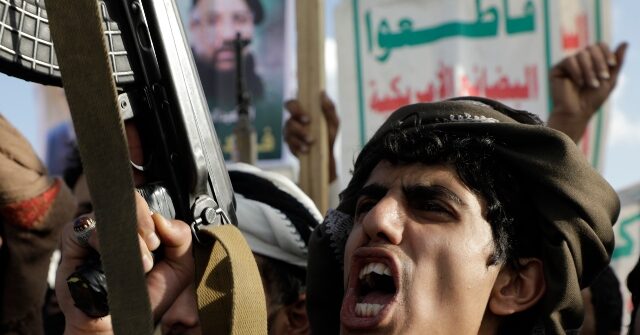We support our Publishers and Content Creators. You can view this story on their website by CLICKING HERE.

U.S. Special Envoy for Yemen Tim Lenderking said on Thursday that leaders of the Iran-backed Houthi terrorists in Yemen have decided to keep lower profiles following the devastation of Iran’s other regional proxies, Hezbollah and Hamas, at the hands of Israel, followed by the overthrow of Iran’s client Bashar Assad in Syria by a Sunni Islamist insurgency.
“Houthi leaders have lowered their profiles, at least physically. There’s a fear of being targeted like other leaders in the region,” Lenderking told the Doha Forum, an annual diplomatic conference in Qatar.
“I think that that’s a reflection of the reality that’s going on in the region, but it hasn’t tempered their ability and their willingness and their determination to fire at ships,” he said.
“Since Hezbollah’s decline and Hamas’ decline, the Houthis have kept right up, kept a steady drumbeat of reckless, indiscriminate attacks. But they would do well to pay heed to what’s happening in the region when it comes to their own security and position,” he advised.
“Look what’s happening to their comrades in Hezbollah, Hamas, Syria. Most Yemenis don’t really like the Houthis. Pressure is building on the Houthis to change course,” he said.
The Houthis look like the most secure of Iran’s regional proxies at the moment, which is not really saying much. The savages of Hamas started a war that brought them to the brink of collapse by attacking Israel on October 7. Hezbollah in Lebanon jumped in to assist Hamas with rocket attacks but was decimated by Israel in return, with much of its leadership eliminated.
Iran’s bought-and-paid-for foot soldiers in the Shiite militia gangs of Iraq decided not to get involve in the Syrian insurgency after sending a few hundred fighters across the border. Assad was toppled after less than two weeks of fighting, his army collapsing into dust without heavy backing from Russia and Iran, neither of which could afford to provide any more support.
That leaves the Houthis, who have been attacking global shipping through the Red Sea for the past year, ostensibly to punish Israel for its war effort in Gaza. The Houthis have also launched a few missiles and drones at Israel.
As Lenderking noted, the Houthis continued to attack civilian ships despite punitive airstrikes from the U.S. and its allies. The Israelis have also bombed Houthi targets in Yemen.
U.S. Central Command (CENTCOM) said on Tuesday that the Houthis launched another swarm of missiles and drones at merchant vessels, but the attack was repelled by U.S. Navy destroyers escorting the civilian ships.
CENTCOM said it was the second Houthi attack this month to be intercepted by the Navy. The first took place on the evening of November 30. No injuries or damage were reported from either attack.
Lenderking said he hoped the fall of Assad could bring change to Yemen, implicitly because many civilians in Houthi-controlled areas are tired of being ruled by the Shiite Islamist extremists. He said his latest visit to the region “reflects growing frustration with the strong refusal of the Houthis to really put out any sort of signals that they’re interested in de-escalation.”
Lenderking said the U.S. is working with its allies to block weapons smuggling to the Houthis, but he also acknowledged the Yemeni extremists have become more self-sufficient than Iran’s other proxies, able to manufacture a fair amount of their own weapons.
The U.S. envoy said the Houthis have a list of “very specific things they want from us” before they ease off attacking ships in the Red Sea, including the U.S. withdrawing ships from the area, increased foreign aid to Yemen, and lifting the Houthis’ designation as a terrorist organization.
“Even if we get to a pause in the Red Sea attacks, however it’s achieved, we still have a long-term Houthi-Red Sea problem,” he said.
The New York Times (NYT) reported on Wednesday that massive disruptions to the shipping industry from the Houthi attacks are still costing the world billions of dollars.
Houthi harassment has forced most international shipping to sail around Africa, effectively erasing the Suez Canal. This has increased shipping costs by more than 200 percent over the past year, increased the strain on crews, and forced ships to burn much more fuel. Meanwhile, receipts for the Suez Canal are down 60 percent, a massive financial blow to the Egyptian government.
Israel Hayom on Thursday quoted Israel Defense Forces (IDF) analysts who warned the fall of Assad could inspire the Houthis to increase their attacks, because they see an opportunity to seize “a leading role in attacks against Israel.”

 Conservative
Conservative  Search
Search Trending
Trending Current News
Current News 







